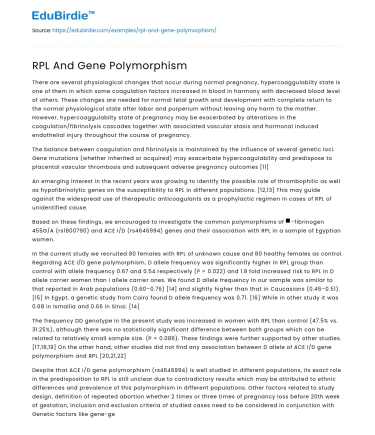There are several physiological changes that occur during normal pregnancy, hypercoaggulabilty state is one of them in which some coagulation factors increased in blood in harmony with decreased blood level of others. These changes are needed for normal fetal growth and development with complete return to the normal physiological state after labor and purperium without leaving any harm to the mother. However, hypercoaggulabilty state of pregnancy may be exacerbated by alterations in the coagulation/fibrinolysis cascades together with associated vascular stasis and hormonal induced endothelial injury throughout the course of pregnancy.
The balance between coagulation and fibrinolysis is maintained by the influence of several genetic loci. Gene mutations (whether inherited or acquired) may exacerbate hypercoagulability and predispose to placental vascular thrombosis and subsequent adverse pregnancy outcomes [11]
Save your time!
We can take care of your essay
- Proper editing and formatting
- Free revision, title page, and bibliography
- Flexible prices and money-back guarantee
An emerging interest in the recent years was growing to identify the possible role of thrombophilic as well as hypofibrinolytic genes on the susceptibility to RPL in different populations. [12,13] This may guide against the widespread use of therapeutic anticoagulants as a prophylactic regimen in cases of RPL of unidentified cause.
Based on these findings, we encouraged to investigate the common polymorphisms of β-fibrinogen 455G/A (rs1800790) and ACE I/D (rs4646994) genes and their association with RPL in a sample of Egyptian women.
In the current study we recruited 80 females with RPL of unknown cause and 80 healthy females as control. Regarding ACE I/D gene polymorphism, D allele frequency was significantly higher in RPL group than control with allele frequency 0.67 and 0.54 respectively (P = 0.022) and 1.8 fold increased risk to RPL in D allele carrier women than I allele carrier ones. We found D allele frequency in our sample was similar to that reported in Arab populations (0.60–0.76) [14] and slightly higher than that in Caucasians (0.46–0.51).[15] In Egypt, a genetic study from Cairo found D allele frequency was 0.71. [16] While in other study it was 0.68 in Ismailia and 0.66 in Sinai. [14]
The frequency DD genotype in the present study was increased in women with RPL than control (47.5% vs. 31.25%), although there was no statistically significant difference between both groups which can be related to relatively small sample size. (P = 0.086). These findings were further supported by other studies. [17,18,19] On the other hand, other studies did not find any association between D allele of ACE I/D gene polymorphism and RPL [20,21,22]
Despite that ACE I/D gene polymorphism (rs4646994) is well studied in different populations, its exact role in the predisposition to RPL is still unclear due to contradictory results which may be attributed to ethnic differences and prevalence of this polymorphism in different populations. Other factors related to study design, definition of repeated abortion whether 2 times or three times of pregnancy loss before 20th week of gestation, inclusion and exclusion criteria of studied cases need to be considered in conjunction with Genetic factors like gene-gene and/ or gene-environment interactions together with epigenetic modulations.
It is well known that ACE gene encodes ACE enzyme which plays an important role in the renin angiotensin system. During normal pregnancy ACE has its impact on maternal and fetal health. As regards maternal side: ACE is an essential regulator of blood pressure and water-electrolyte hemostasis while on the fetal side it has its own finger print on implantation, fetoplacental microvasculature and fetal development. [23] It is well known that carrier individuals with D allele have higher plasma level of ACE enzyme than carriers of I allele. High ACE level results in hypofibrinolysis and increased tendency to intravascular thrombosis through its enhancement of several biological pathways, for example angiotensin I conversion to angiotensin II, increased production of endothelial plasminogen activator inhibitor-1 (PAI-1), and placental plasminogen activator inhibitor-2 (PAI-2) and reduced nitric oxide levels. [24]
In order to study the relative risk to RPL under different genetic models of β-fibrinogen 455G/A (rs1800790) and ACE I/D (rs4646994) gene variants, ORs and 95% CIs were used in the current study. We found the risk was significantly low with recessive model ACE I/D gene polymorphism (OR: 0.502(0.26-0.96), P =0.035) and the risk was 1.82 high in dominant model (OR: 1.82 (0.79-4.15), but it was statistically non significant (P=0.151). Overall we cannot assume the recessive model of ACE I/D polymorphism exerts a protective role against RPL unless these observations are confirmed by a large comprehensive study.
In the current studied sample, there was lack of association between genotypes and alleles of β-fibrinogen 455G/A (rs1800790) gene polymorphism and RPL. The same was reported by Attilli et al 2019 and Alastal et al 2014. [25,26] A meta-analysis done by Li et al 2015 [27] concluded no significant association between β-fibrinogen 455G/A (rs1800790) polymorphism and recurrent pregnancy loss under different genetic models, in the Asian and Caucasian subgroups. Hardly we found one Egyptian study reported a significant association between RPL and β-fibrinogen 455G/A genotypes and G allele [28] which matched with Ticconi et al [6] and Torabi et al [29]
There was paucity of studies concerning β-fibrinogen gene polymorphisms and risk of RPL especially in Arab countries. Overall, most studies failed to find meaningful association of β-fibrinogen 455G/A (rs1800790) polymorphism with RPL. But when screening for this polymorphism was done in combination with other thrombophilic genes, significant results were obtained in some studies. [30]
Finally, the discrepancy between studies regarding the genetic predisposition of thrombophilia made many clinicians more satisfied to routine genetic screening for thrombophila and prophylactic anticoagulant use in cases of RPL. However, the new ESHRE guidelines published in 2018 [3] recommended that genetic screening should not be done routinely in any woman with RPL unless there is evidence of other risk factors for thromboembolism in association with inherited thrombophila; in such cases antithrombotic prophylaxis (heparin and low-dose aspirin) may improve the live birth rate.






 Stuck on your essay?
Stuck on your essay?

